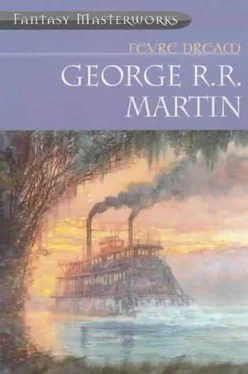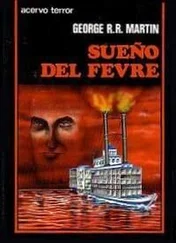George Martin - Fevre Dream
Здесь есть возможность читать онлайн «George Martin - Fevre Dream» весь текст электронной книги совершенно бесплатно (целиком полную версию без сокращений). В некоторых случаях можно слушать аудио, скачать через торрент в формате fb2 и присутствует краткое содержание. Жанр: Фэнтези, на английском языке. Описание произведения, (предисловие) а так же отзывы посетителей доступны на портале библиотеки ЛибКат.
- Название:Fevre Dream
- Автор:
- Жанр:
- Год:неизвестен
- ISBN:нет данных
- Рейтинг книги:4 / 5. Голосов: 1
-
Избранное:Добавить в избранное
- Отзывы:
-
Ваша оценка:
- 80
- 1
- 2
- 3
- 4
- 5
Fevre Dream: краткое содержание, описание и аннотация
Предлагаем к чтению аннотацию, описание, краткое содержание или предисловие (зависит от того, что написал сам автор книги «Fevre Dream»). Если вы не нашли необходимую информацию о книге — напишите в комментариях, мы постараемся отыскать её.
Fevre Dream — читать онлайн бесплатно полную книгу (весь текст) целиком
Ниже представлен текст книги, разбитый по страницам. Система сохранения места последней прочитанной страницы, позволяет с удобством читать онлайн бесплатно книгу «Fevre Dream», без необходимости каждый раз заново искать на чём Вы остановились. Поставьте закладку, и сможете в любой момент перейти на страницу, на которой закончили чтение.
Интервал:
Закладка:
So, you see, I am some 72 years old, and I did indeed enjoy the good fortune of meeting Lord Byron. That was some time later, however.
My father was as I am. So were two of our servants, two who were not truly servants but companions. The three adults of my race taught me languages, manners, much of the world… and cautions. I slept by day, went out only by night, learned to fear the dawn as children of your race, having been burned, learn to fear fire. I was different from others, I was told, superior and apart, a lord. I must not talk of those differences, though, lest the cattle fear me and kill me. I must pretend that my hours were simply a matter of preference. I must learn and observe the forms of Catholicism, even take communion at special midnight masses in our private chapel. I must-well, I will not go on. You must realize, Abner, I was only a child. I might have learned more in time, might have begun to comprehend the why and the wherefore of those around me and the life we led, had things continued. I would then have been another person.
In 1789, however, the fires of the Revolution changed my life irrevocably. When the Terror came, we were taken. For all his cautions, his chapels and his mirrors, my father had aroused suspicion by his nocturnal habits, his solitude, his mysterious wealth. Our servants-our human servants-denounced him as a warlock, a satanist, a disciple of the Marquis de Sade. And he called himself an aristocrat as well, the blackest sin of all. His two companions, being seen only as servants themselves, managed to slip away, but my father and I were taken.
Young as I was, I have vivid memories of the cell in which we were imprisoned. It was cold and damp, all rough stone, with a great door of iron so thick and heavily barred that even my father’s great strength was no use against it. The cell stank of urine, and we slept without blankets, in filthy straw scattered over the floor. There was one window, but it was far above us, slanting through a solid stone wall at least ten feet thick. It was very small, and the outside was heavily barred. We were actually below the ground, I think, in a sort of cellar. Very little light filtered down to us, but of course that was a blessing in disguise.
When we were alone, my father told me what I must do. He could not even get to the window, the gap in the stone being so narrow, but I could; I was still small. And I had the strength to deal with the bars. He ordered me to leave him. He gave me other advice as well. To wear rags and draw no attention to myself. To hide by day, and pilfer food by night. Never to tell anyone how I was different. To find myself a cross, and wear it. I did not understand half of what he said, and soon forgot much of it, but I promised to obey. He told me to leave France, and to seek out the servants who had fled. I was not to try to avenge him, he said. I would have vengeance enough in time, for all these people would die and I would live. Then he said something I have never forgotten. “They cannot help themselves. The red thirst is on this nation, and only blood will sate it. It is the bane of us all.” I asked him what the red thirst was. “You will know it soon enough,” he told me. “It cannot be mistaken.” Then he bid me go. I squeezed up the narrow aperture to the window. The bars were old and rusted through. Since it was impossible to get to them, no one had given thought to their replacement. They broke away in my hands.
I never saw my father again, but later, after the Restoration that followed Napoleon, I made inquiries after him. My disappearance had sealed his fate. He was clearly a sorcerer as well as an aristocrat. He was tried, convicted. He lost his head to a provincial guillotine. Afterward they burnt his body, because of the charge of sorcery.
But I knew none of this then. I fled the prison and the province and wandered to Paris, where survival was easy in those days, so chaotic was the situation. By day I took refuge in cellars, the darker the better. By night I came forth and stole food. Meat, chiefly. I had little taste for vegetables or fruits. I became a proficient thief. I was fast, silent, and terribly strong. My nails seemed sharper and harder each day. I could claw through wood when I had a mind to. No one noticed me or questioned me. I spoke good, cultured French, fair English, and a smattering of low German. In Paris I picked up the gutter tongue as well. I searched for our vanished servants, the only others of my race I had ever known, but I had no clue how to find them, and my efforts came to nothing.
So I grew up among your people. The cattle. The people of the day. I was clever and observant. Much as I looked like those around me, I soon realized how truly different I was. And better, as I had been told. Stronger, quicker, and-I believed-longer-lived as well. Daylight was my only weakness. I kept my secret well.
The life I led in Paris, however, was mean and degraded and boring. I wanted more. I began to steal money as well as food. I found someone to teach me how to read, and thereafter I stole books whenever I could. Once or twice I was almost caught, but I always got away. I could melt into shadows, scale walls in the winking of an eye, move as quietly as a cat. Perhaps those who pursued me thought I changed into a mist. It must have seemed that way at times.
When the Napoleonic Wars began, I was careful to avoid the army, since I knew they would require me to expose myself to daylight. But I followed behind them in their campaigns. I traveled through Europe in that fashion, saw much burning and killing. And where the Emperor went, there was loot for me.
In Austria in 1805, I saw my great chance. On the road by night, I chanced upon a wealthy Viennese merchant fleeing before the French armies. He had all his money with him, converted to gold and silver, a fabulous sum. I stalked him to the inn where he spent the night, and when I was sure he was asleep, broke in to make my fortune. He was not asleep, however. The war had made him afraid. He was waiting for me, and he was armed. He pulled a pistol from beneath his blankets, and shot me.
Shock and pain overwhelmed me. The blow drove me to the floor. It had caught me in the stomach, square, and I bled profusely. But then, suddenly, the flow began to ebb, and the pain lessened. I got up. I must have been a terrible sight, pale-faced and covered with blood. And a strange feeling came over me, one I had never felt before. The moon was coming in through the window, and the merchant was screaming, and before I knew quite what I was doing I was on him. I wanted to silence him, to clamp my hand over his mouth, but… something took hold of me. My hands went to him, my nails-they are very sharp, very hard. I tore open his throat. He choked on his own blood.
I stood there, trembling, watching the black blood spurt out from him, his body thrashing on the bed in the pale moonlight. He was dying. I had seen people die before, in Paris, in the war. This was different. I had killed him. A great passion seemed to fill me, and I felt… desire. I had read often of desire in the books I stole, of lust and the carnal urges to which man is heir. I had never felt any of it. I had looked on naked women, on men, on couples locked in sexual congress, and none of it had touched me. I could not comprehend all this nonsense I read of uncontrollable passions, lusts like fire. But now I knew them. The blood flowing, this fat rich man dying in my hands, the noises he made, his feet beating on the bed. It all excited some animal deep within me. The blood drenched my hands. It was so dark and hot. It steamed as it came from his throat. So I leaned forward and tasted it. The taste made me mad, feverish. Suddenly I had plunged my face into his neck, ripping with my teeth, sucking up the blood, tearing, swallowing. He stopped thrashing. I fed. And then the door opened, and there were men with knives and rifles. I looked up, startled. How I must have terrified them. Before they could act, I was through the window and gone into the night. I had the presence of mind to grab the money belt as I went. It had only a fraction of the man’s fortune in it, but it was enough.
Читать дальшеИнтервал:
Закладка:
Похожие книги на «Fevre Dream»
Представляем Вашему вниманию похожие книги на «Fevre Dream» списком для выбора. Мы отобрали схожую по названию и смыслу литературу в надежде предоставить читателям больше вариантов отыскать новые, интересные, ещё непрочитанные произведения.
Обсуждение, отзывы о книге «Fevre Dream» и просто собственные мнения читателей. Оставьте ваши комментарии, напишите, что Вы думаете о произведении, его смысле или главных героях. Укажите что конкретно понравилось, а что нет, и почему Вы так считаете.












